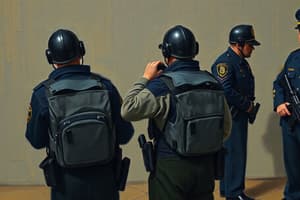Podcast
Questions and Answers
Which of the following is NOT considered a fact required to establish probable cause?
Which of the following is NOT considered a fact required to establish probable cause?
- Direct investigation or reports
- Second-hand statements from reliable sources
- Second-hand statements from unreliable sources (correct)
- Circumstantial evidence
What does the level of suspicion required for probable cause depend on?
What does the level of suspicion required for probable cause depend on?
- The location of the search or arrest
- The type of investigation being conducted
- The nature of the evidence presented (correct)
- The type of warrant being applied for
What type of evidence can be used to help establish probable cause?
What type of evidence can be used to help establish probable cause?
- Random guesses
- Hearsay from a neighbor
- Circumstantial evidence (correct)
- Unverified tips
Which of the following statements is true regarding probable cause?
Which of the following statements is true regarding probable cause?
Which of the following can be classified as circumstantial evidence?
Which of the following can be classified as circumstantial evidence?
What does probable cause require beyond mere suspicion?
What does probable cause require beyond mere suspicion?
According to the court findings, probable cause includes whether the facts are sufficient to warrant what kind of individual?
According to the court findings, probable cause includes whether the facts are sufficient to warrant what kind of individual?
Which of the following best describes the legal concept of probable cause?
Which of the following best describes the legal concept of probable cause?
What case established the definition of probable cause mentioned in the document?
What case established the definition of probable cause mentioned in the document?
Which of the following statements about reasonable suspicion and probable cause is accurate?
Which of the following statements about reasonable suspicion and probable cause is accurate?
What primarily determines whether probable cause is present?
What primarily determines whether probable cause is present?
Probable cause requires sufficiency of information to justify what action by an officer?
Probable cause requires sufficiency of information to justify what action by an officer?
In the context of law enforcement, what does a man of reasonable caution do?
In the context of law enforcement, what does a man of reasonable caution do?
What is a key requirement for a tip to support a detention?
What is a key requirement for a tip to support a detention?
Which statement is true regarding anonymous tips?
Which statement is true regarding anonymous tips?
What type of risk could justify a detention based on a tip?
What type of risk could justify a detention based on a tip?
Which of the following is NOT a consideration for the reliability of a tip?
Which of the following is NOT a consideration for the reliability of a tip?
What can contribute to establishing the reliability of an anonymous tip?
What can contribute to establishing the reliability of an anonymous tip?
Which factor does NOT enhance the credibility of a tip?
Which factor does NOT enhance the credibility of a tip?
How can information from a reliable source trigger investigative action?
How can information from a reliable source trigger investigative action?
For a tip to lead to a lawful detention, what must the officers demonstrate?
For a tip to lead to a lawful detention, what must the officers demonstrate?
What is a probable cause to arrest?
What is a probable cause to arrest?
Which statement accurately describes a detention?
Which statement accurately describes a detention?
Under NRS 171.124, which of the following is NOT a condition for making an arrest?
Under NRS 171.124, which of the following is NOT a condition for making an arrest?
What differentiates a detention from an arrest?
What differentiates a detention from an arrest?
What can lead a peace officer to make an arrest without a warrant?
What can lead a peace officer to make an arrest without a warrant?
Which scenario would best support the concept of probable cause?
Which scenario would best support the concept of probable cause?
During which condition would a peace officer be authorized to arrest someone?
During which condition would a peace officer be authorized to arrest someone?
Which of the following illustrates a situation that does NOT constitute probable cause?
Which of the following illustrates a situation that does NOT constitute probable cause?
What must occur for evidence seized during a search to be admissible in proceedings?
What must occur for evidence seized during a search to be admissible in proceedings?
What is the maximum duration a person can be detained before probable cause must be established?
What is the maximum duration a person can be detained before probable cause must be established?
According to Nevada law, what should happen if no probable cause for arrest is found after detaining an individual?
According to Nevada law, what should happen if no probable cause for arrest is found after detaining an individual?
What action can law enforcement take if a weapon is disclosed during a search?
What action can law enforcement take if a weapon is disclosed during a search?
What is required from peace officers when conducting a detention under NRS 171.123?
What is required from peace officers when conducting a detention under NRS 171.123?
What happens if a weapon is discovered during an unlawful search?
What happens if a weapon is discovered during an unlawful search?
What is the primary focus of NRS 171.1231 concerning detained individuals?
What is the primary focus of NRS 171.1231 concerning detained individuals?
During a detention, what must peace officers do if they suspect a crime has occurred?
During a detention, what must peace officers do if they suspect a crime has occurred?
What is required for an officer to make an arrest based on reasonable cause?
What is required for an officer to make an arrest based on reasonable cause?
Which of the following describes a condition that allows an officer to arrest a suspect without a warrant?
Which of the following describes a condition that allows an officer to arrest a suspect without a warrant?
What can lead to an arrest based on the issuance of a warrant?
What can lead to an arrest based on the issuance of a warrant?
Which statement accurately reflects a situation where reasonable cause exists?
Which statement accurately reflects a situation where reasonable cause exists?
Which of the following is NOT a basis for arresting an individual?
Which of the following is NOT a basis for arresting an individual?
What does 'reasonable cause' refer to in the context of making an arrest?
What does 'reasonable cause' refer to in the context of making an arrest?
In which scenario can an officer act on a warrant?
In which scenario can an officer act on a warrant?
What does it mean when an officer has 'reasonable cause' in relation to an arrest?
What does it mean when an officer has 'reasonable cause' in relation to an arrest?
Flashcards
Probable Cause
Probable Cause
A level of certainty required by law enforcement officers before they can make an arrest, conduct a search, or seize property. It means that there are enough facts and circumstances to reasonably believe that a crime has been committed or is being committed.
Reasonable Suspicion
Reasonable Suspicion
A legal standard that must be met for a law enforcement officer to legally stop and detain a suspect. It requires more than a hunch or a mere suspicion but less than probable cause.
Brinegar v. U.S.
Brinegar v. U.S.
A 1949 Supreme Court case defining probable cause as the level of certainty that would lead a reasonable person to believe a crime has been or is being committed. This case emphasized that it's not about technicalities but about the factual considerations of everyday life.
Role of a reliable source in investigations
Role of a reliable source in investigations
Signup and view all the flashcards
Reliability of Sources
Reliability of Sources
Signup and view all the flashcards
Detention based on a tip
Detention based on a tip
Signup and view all the flashcards
Anonymous Tips in Detention
Anonymous Tips in Detention
Signup and view all the flashcards
Collaborative Evidence & Reliability
Collaborative Evidence & Reliability
Signup and view all the flashcards
Impact of anonymous tips on detention
Impact of anonymous tips on detention
Signup and view all the flashcards
Detention for immediate public risk
Detention for immediate public risk
Signup and view all the flashcards
Detention based on immediate public risk
Detention based on immediate public risk
Signup and view all the flashcards
Circumstantial evidence
Circumstantial evidence
Signup and view all the flashcards
Reliable sources
Reliable sources
Signup and view all the flashcards
Direct investigation
Direct investigation
Signup and view all the flashcards
Consistency of probable cause standard
Consistency of probable cause standard
Signup and view all the flashcards
Probable Cause to Arrest
Probable Cause to Arrest
Signup and view all the flashcards
Detention or Stop
Detention or Stop
Signup and view all the flashcards
Arrest
Arrest
Signup and view all the flashcards
Arrest Warrant
Arrest Warrant
Signup and view all the flashcards
Warrantless Arrest
Warrantless Arrest
Signup and view all the flashcards
Public Offense in Officer's Presence
Public Offense in Officer's Presence
Signup and view all the flashcards
Felony
Felony
Signup and view all the flashcards
Gross Misdemeanor
Gross Misdemeanor
Signup and view all the flashcards
Arrest based on felony/misdemeanor
Arrest based on felony/misdemeanor
Signup and view all the flashcards
Arrest based on reasonable cause
Arrest based on reasonable cause
Signup and view all the flashcards
Arrest based on warrant
Arrest based on warrant
Signup and view all the flashcards
Definition of Probable Cause
Definition of Probable Cause
Signup and view all the flashcards
Reasonable Cause for Warrant Arrest
Reasonable Cause for Warrant Arrest
Signup and view all the flashcards
Seizure of Evidence During Detention
Seizure of Evidence During Detention
Signup and view all the flashcards
Admissibility of Seized Evidence
Admissibility of Seized Evidence
Signup and view all the flashcards
Arrest After Detention
Arrest After Detention
Signup and view all the flashcards
Release After Detention
Release After Detention
Signup and view all the flashcards
Detention
Detention
Signup and view all the flashcards
Inquiry During Detention
Inquiry During Detention
Signup and view all the flashcards
Time Limit for Detention
Time Limit for Detention
Signup and view all the flashcards
Study Notes
Lander County Sheriff's Office Training Academy - Probable Cause
- Course Title: Probable Cause
- NAC References: 289.140, 150, 160, and 170
- Target Audience: Lander County Sheriff's Office Deputy Trainees
- Instructor: Lander County Sheriff's Office Training Staff
- Method of Instruction: Lecture, Handouts, Powerpoint
- Course Length: Not specified
- Revision Date: Not specified
Probable Cause Lesson Plan
- Instructional Goal: Develop student understanding of probable cause, application, and articulation.
- Student Performance Objectives: Students will pass a written exam at or above 80% upon completion covering defined terms, distinctions, and relevant Nevada Revised Statutes (NRS).
- Define: Reasonable Suspicion, Probable Cause
- Explain: Differences between reasonable suspicion and probable cause
- Identify:
- Elements of NRS 171.124 (When a peace officer may arrest)
- Elements of NRS 171.1232/171.123 (Detentions and pat downs)
- Requirements if probable cause is developed during an investigative detention
Reasonable Suspicion
- Introduction: Peace officers must have a reason (articulable facts) to detain a person lawfully.
- Definition: Reasonable suspicion exists when a peace officer has enough facts and circumstances to reasonably suspect criminal activity and connect the detained person to that activity.
- Factors Establishing Reasonable Suspicion: Hour of the day, unusual presence, high-crime area, unusual dress/actions, smell, information from witnesses, statements by a suspect, personal knowledge of a suspect
- Basis for Reasonable Suspicion: Observations, personal training/experience, information from witnesses, victims, or other officers (totality of circumstances).
Contributing Factors
- Appearance/condition (intoxication, resembling wanted person)
- Actions (hiding objects, running from scene)
- Driving behaviors
- Knowledge of criminal history
- Demeanor (nervousness, non-responsiveness)
- Time of day (unusualness)
- Location of the stop
- Officer training/experience
Role of a Reliable Source
- Peace officers can use information from others to investigate possible criminal actions and detain those involved.
- Information doesn't need to come from a proven reliable source.
- Anonymous tips can support detention if the surrounding circumstances make the information believable or if the source's identity is known, or if the risk to public is immediate (e.g., DUI).
Court Findings Regarding Probable Cause
- Probable cause requires more than bare suspicion.
- Officer's knowledge of facts and circumstances, reasonably trustworthy information, warranted belief that a crime was committed.
- Practical considerations (not just legal technicalities) are important when evaluating probable cause.
- Includes direct investigation, reports, circumstantial evidence, reliable sources.
Sources/Factors Contributing To Probable Cause
- Observations of the affiant
- Fellow officer information(s)
- Suspect's reputation
- Officer knowledge of suspects' modus operandi
- Confidential informant information
- Anonymous informant information
- Citizen informant information
Reasonable Suspicion vs. Probable Cause
- Probable cause is a higher standard of suspicion than reasonable suspicion.
- Factors that contribute to establishing reasonable suspicion can also be used to establish probable cause.
Officer Training and Experience
- Officer expertise is a factor in determining probable cause.
- An activity that appears innocent to a layperson might appear suspicious to a trained officer.
Elements of Detention and Probable Cause
- Arrest involves taking a person into custody.
- Probable cause is a set of facts that would cause a reasonable person to believe the suspect is guilty of a crime (for arrest).
- Detention/Stop occurs when someone is not free to leave (limited in scope, intensity, and duration; not an arrest).
- NRS 171.124 describes situations where an officer can make lawful arrests, with/without a warrant.
Terry Stop
- A temporary detention that is deemed not unreasonable based on articulated reasonable suspicion of an individual connected to criminal activity.
- Limited in scope
- The Terry v Ohio case established this standard.
- The duration of the detention is dependent on the circumstances.
- The Terry Stop does not have to result in an arrest.
- Officer safety an important reason for detention of a suspect.
Nevada and Terry v. Ohio
- Nevada's statutes (NRS 171.123, 171.1232) mirror the Terry v. Ohio decision.
- Officers can detain individuals under reasonable suspicion connected to criminal activity.
- Detention should not last longer than needed, usually 60 minutes without new, articulable suspicion.
- Officers must comply with NRS 171.1231 regarding detention duration and the need to arrest if probable cause is established, or release if not.
Officer Conduct During Detentions
- Officers must reasonably believe a suspect is armed and a threat prior to a search for weapons.
- NRS 171.1231 sets a timeframe for detentions, with the requirement to arrest or release (cannot exceed 60 min).
- Seized evidence is admissible in court only if the search was authorized/compliant with the law.
Studying That Suits You
Use AI to generate personalized quizzes and flashcards to suit your learning preferences.





